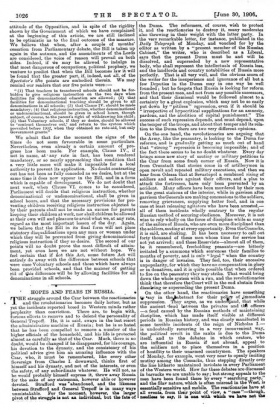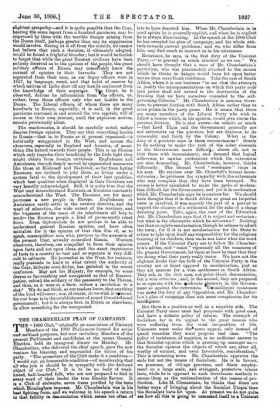• HOPES AND FEARS IN RUSSIA, a P E struggle around
the Czar between the reactionaries • and the revolutionaries becomes daily hotter, but as yet the incidents reported breed in Western minds rather perplexity than conviction. There are, to begin with, furious efforts to remove and to defend the personality of General Trepoff. He, it is said, sways in the last resort the administrative machine of Russia; but he is so hated that he has been compelled to remove a number of the higher officials of the household, and his life is protected almost as carefully as that of the Czar. Much, there is no doubt, would be changed if he disappeared, for his courage, his devotion to the dynasty, and the consistency of his political advice give him an amazing influence with the Czar, who, it must be remembered, like every other Sovereign from Charles I. downward, thinks first of himself and his dynasty, and not of the interests, or even the safety, of any subordinate whatever. He will not, as he would probably himself express it, throw away Russia for the sake of any statesman, however able or however devoted. Strafford was abandoned, and the likeness between Strafford and General Trepoff is in many ways unmistakable. For the moment, however, the larger pivot of the struggle is not an individual, but the fate of the Duma. The reformers, of course, wish to protect it, and the reactionaries to destroy it, many moderates also throwing in their weight with the latter party. In the very remarkable letter, for instance, published in the Daily Telegraph of Monday, and vouched for by the editor as written by a " present member of the Russian Cabinet," the writer, who is described as a Liberal, says that the present Duma must be and will be dissolved, and superseded by a new representative body, who shall represent the intellectuals of Russia less, and the landlords and country notabilities of Russia more perfectly. That is all very well, and the obvious scorn of the writer for the inexperience and ignorance of all but a few Deputies in the Duma may in one way be well founded ; but he forgets that Russia is looking for reform from the present men, and not from any possible successors, and that their dismissal would be followed almost to a certainty by a gieat explosion, which may not be so easily put down by " pitiless ' repression, even if it should be " irrespective of hypocritical supplications for an amnesty, pardons, and the abolition of capital punishment." The success of such repression depends, and must depend, upon the temper of the troops, and about that temper and its rela- tion to the Duma there are two very different opinions.
On the one hand, the revolutionaries are arguing that the Army, like the peasantry, is looking to the Duma for reforms, and is gradually getting so much out of hand that " strong " repression is becoming impossible; and of the fact there seems to be no doubt whatever. Every day brings some new story of mutiny or military petitions to the Czar from some fresh corner of Russia. Now it is from Cronstadt that stories come in of artillerymen in open revolt and repeated military executions, and then we hear from Odessa that at Sevastopol a combined rising of soldiers and sailors against their officers, and a plan to attack the fortresses, have only been prevented by an accident. Many officers have been murdered by their men in the great stations of the interior, while in garrison after garrison the Generals are mating concessions to the soldiers, removing grievances, supplying better food, and in one ease at least releasing agitators who have been arrested,— all of them incidents wholly contrary to the regular Russian method of securing obedience. Moreover, it is not wise to rely wholly on the force of discipline while so many of the sailors of Russia, who are even more disciplined than the soldiers, mutiny at every opportunity. Even the Cossacks, it is said, are shaking. It has been necessary to call out forty thousand of these men whose time for service has not yet arrived; and these Reservists—almost all of them, be it remembered, freeholding peasants—are bitterly irritated by a summons which sentences their families to months of poverty, and is only " legal " when the country is in danger of invasion. They feel, too, their excessive unpopularity, for which they have no compensation in glory or in donatives, and it is quite possible that when ordered to fire on the peasantry they may strike. That would bring down the whole system with a run, and the revolutionaries think that therefore the Court will in the end abstain from dissolving or superseding the present Duma.
On the other hand, the reactionaries have something tip *say in the abstract for their policy of eiMmediate suppression. They argue, as we under land, that while the ancient feud between the privates and tilt officers —a feud caused by the Russian methods of maintaining discipline, which has made itself visible at different periods in Russian history, and was clearly manifested in some terrible incidents of the reign of Nicholas I.— is undoubtedly recurring in a very inconvenient way, the political revolt in the ranks is due to the Duma itself, and to the debates in which orators, who are influential in Russia if not abroad, appeal to the soldiers not to place themselves in a position of hostility to their unarmed countrymen. The speakers of Monday, for example, went very near to openly inciting mutiny among the Cossacks, thus stepping directly over the line hitherto maintained inviolate in every Parliament of the Western world. How far these debates are discussed in barracks we are unable to say; but strong appeals to the men have been found there by every " searching party," and the Slav nature, which is often misread in the West, is essentially sensitive and mobile. The reactionaries have at all events, from their point of view, a " case "—though, needless to say, it is one with which we have not the ijlightest sympathy _andit is quite possible that the Czar, hearing the same report from a hundred garrisons, may be impressed by them with the terrible danger arising from the Duma itself, perhaps greater than any its suppression would involve. Gazing at it all from the outside, we cannot but believe that such a decision, if ultimately adopted, would be found a frightful blunder; but it would be foolish to forget that while the great Russian civilians have been entirely deceived as to the opinion of the,people, the great military officers of Russia may conce/bably know the current of opinion in their barracks. They are not separated from, their men, as our Sepoy officers were in 1857, by language, creed, and that habit of reserve by which natives of India shut off any hostile sentiment from the knowledge of their superiors. Tie Court, be it observed, derives its information from the officers, or, rather, from those officers only who are hostile to the Duma. The Liberal officers, of whom there are many hundreds in Russia, especially, it is said, in the great garrisons cantoned in and around the two capitals, will of course in their own interest, until the explosion arrives, remain persistently silent.
The reactionaries, it should be carefully noted, rather despise foreign opinion. They say that everything hostile to Russia—that is, to Russia as at present organised—is habitually exaggerated iu the West, and accuse the observers, especially in England and America, of some- thing like hatred towards their people. This is an illusion which only impedes their benefiting by the little light they might obtain from foreign criticisms. Englishmen and Americans, though deeply moved by unpunished massacres like those at Kishineff and Bialystok, so far from hating Russians, are inclined to pity them, as living under a system fatal to the development of their best qualities, which best qualities when displayed in their literature are very heartily acknowledged. Still, it is quite true that the West may misunderstand Russians, as Russians constantly misunderstand the West. The Russians are for many purposes e. new people in Europe. Englishmen or Aroerioane rarely settle in the country districts, and the want of education, the wide extent of the territory, and the hugeness of the mass of its inhabitants all help to render the Russian people a kind of permanently silent force. Even diplomatists do not profess to be able to understand general Russian opinion, and have often mistaken for it the opinion of that thin film of, so to @Peak, neatilepolitan men who, previous to the accession of the present Czar, actually controlled Russia, Western observers, therefore, are compelled to form their opinion upon facts and not upon ideas, and the (newt importance of facts in a country so vast and so separate is very diffi- enit to eatimate, No journalist in the West, for instance, really pretends to know to what extent the authority of the Czar, hitherto semi-divine, has perished in the recent Confusion. May not his Iliajesty, for example, by some decree as far-reaching and unexpected as that of Emanci- pation, rebind the soldiery or the peasantry to the Throne, and thus, as it were at a blow, reduce a revolution to a qt ? We do not think, as our readers know, that anything of the kind will occur ; nor, of course, do we wish it tooccur, for our hope is is the establishment of sewn" Constitutional government ; but it is always best, in Russia as elsewhere, to. allow something for the unexpected. •



























































 Previous page
Previous page